America’s first “Sexual Revolution”
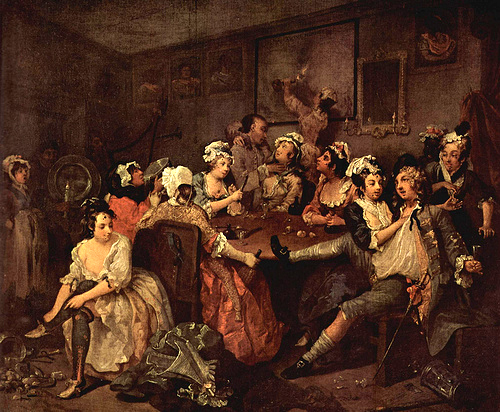
Often referred to as the “oldest profession on earth,” prostitution has been a mainstay in and around military encampments since biblical times. Today the act of trading sex for money remains a seedy yet implicit part of the social interaction between many of the world’s occupying troops and the regions in which they inhabit. As many of these armies are often located in third-world countries or destructive war zones, the economically challenged and impoverished civilians that surround them are left with few alternatives for generating income. Out of desperation many women turn to selling their bodies to locally stationed soldiers and sailors in order to feed their families. As a result, many of these ports and bases are known primarily throughout the military community for their brothels.American armies are certainly no stranger to eliciting the services of prostitutes. From the Revolutionary and the Civil Wars, through WW2, Vietnam, and even today, U.S. troops always have, and always will, pay for female companionship. When George Washington was a young military man brothels could be found in port cities like New York; Philadelphia; Charleston, S.C.; and Newport, R.I. Prostitution was also ubiquitous in Philadelphia’s “Hell Town,” the prototype for the red light districts that would spread across America in the next century. Philly’s most famous resident Benjamin Franklin himself admitted to hiring his share of strumpets, as he called them.
In The Urban Geography of Commercial Sex: Prostitution in New York City, 1790-1860: The Other Americans: Sexual Variance in the National Past, Dr. Timothy Gilfoyle writes that, “For much of the eighteenth century, ‘courtesans’ promenaded along the Battery after nightfall. On the eve of the Revolution, over 500 ‘ladies of pleasure [kept] lodgings contiguous within the consecrated liberties of St. Paul’s [Chapel].’ A few blocks north, at the entrance to King’s College (later Columbia University), Robert M’Robert claimed that dozens of prostitutes provided ‘a temptation to the youth that have occasion to pass so often that way.”
The introduction of prostitution in American military encampments came during the nation's first fight. Droves of “Lewd women” as they were referred to, flocked to the tents of the Continental Army whether they were in winter quarters or on campaign.
Prostitutes were a worrisome presence to army leadership, particularly because of the possible spread of venereal diseases. According to the book Belonging to the Army by Holly Ann Mayer, dealing with prostitution was an ongoing problem: “Reports regarding the incidence of venereal disease among male soldiers present a serious matter for a military force too often far below quota in numbers of fighting troops.” Mayer also states that “commanders tried to prevent the spread of social diseases and ... social and military disorder by banning prostitutes from their camps.” No doubt those women who sought follower status in the army avoided acts of prostitution to preserve their place in the Continental community, since they full well knew they would be drummed out of the service if caught.
Despite the health risks some army officers encouraged the presence of prostitutes to help maintain morale. They also turned a blind eye to their troops midnight patronagie of nearby brothels. Often men would sneak out to visit local whore houses after their commanders retired for the night. In New York, this covert act was referred to as visiting “the holy ground,” while in Virginia their seedy destinations were called “disorderly houses.”
Even Valley Forge, the most famous of all Continental Army encampments was not immune to the pleasures of the flesh. Despite the fact that General George Washington himself had set strict standards that prohibited the fraternization between single men and women, local prostitutes were able to infiltrate the camp. (Ironically little has changed as there are currently 22 escort services operating in and around the Valley Forge area.)
Despite their reputation as a more liberal society the French in particular found the wide-spread prostitution in the Colonies quite perplexing. As the French Army arrived in America to assist the fledgling Continental Army from inevitable annihilation, many of them recorded their personal impressions of the locals in their journals. One French officer, Comte de Clermont-Crevecoeur, while in Newport, Rhode Island, wondered why there were so many prostitutes, “in a country so new where vice should not be deeply rooted…” He attributed this epidemic to the peculiar practice of “Bundling”:
Bundling was an activity granted by parents that permitted a young man who declared himself to be in love with a girl to shut himself up in a room with her, lavishing tender caresses upon her in bed, but “stopping short of those reserved for marriage alone; otherwise he would transgress the established laws of bundling.” A truly virtuous woman would resist and conform to the letter of the law, while “those more amply endowed by nature in this respect succumb to this tender sport.” What’s more, a couple could play this game for five or six years or longer before deciding to marry, without committing finally to wedlock. If a girl was seduced and had a child, it was not she who was disgraced, but the man. Respectable houses were closed to him, and he could not marry into one of the better families.
A married woman, he continued, was very faithful to her husband, even though she might have led “a most licentious life” in the years before marriage. Men didn’t seem to mind this; they were not fussy and believed a girl should be free until she was married. If a married woman committed adultery, the husband announced his wife’s “delinquency” and published it in the papers, stating that he would neither pay her bills nor be liable for her debts. Yet even if the situation deteriorated to that stage, adultery was no excuse for dissolving a marriage—the laws did not permit it, and the husbands were quite patient about waiting for their wives to repent. (– Pages 81-82)
Some scholars acknowledge the impact of prostitution on the Colonials during the American Revolution, but also believe the English army was far more frequent in the practice of it. According to an article in the Pittsburgh Post Gazette, Duquesne University history professor Holly A. Mayer has developed years of research on the “camp followers” who accompanied the army during the Revolutionary War. She’s the first to acknowledge that there is a long-standing relationship between prostitution and the military. “You can go outside any Army post today, and you’re going to find three things: bars, car dealers and some sort of prostitution service.” But prostitution depends on cash, and by and large, soldiers in the Continental Army were too poor to offer prostitutes much steady employment, she said. “If prostitutes were going to follow any army then, they would have followed the British Army, because they got paid in good, hard currency.”
Regardless of their loyalties many prostitutes followed whatever army was closest in pursuit of their purse. These ladies of the night continued to provide sexual services to both sides of the conflict until the British Army’s surrender at Yorktown in 1781. Despite the post-war departure of the English, French and Continental troops, prostitution among the local standing military continued intermittently during the War of 1812 and remerged in force at army encampments on both sides during America’s Civil War.
Next Film Project:
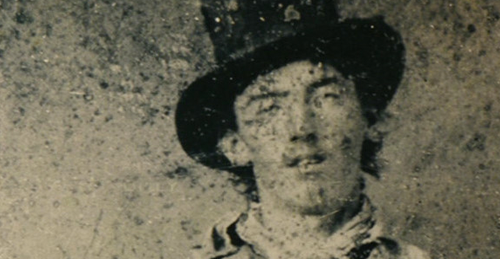

PRESS RELEASE: Right Stripe Media LLC has recently purchased the rights to produce a documentary based on the Sunstone Press book “Blackwater Draw, Three Lives, Billy the Kid and the Murders that Started the Lincoln County War” by David S. Turk. Consulting in front of and behind the camera are noted law-enforcement historians David Turk and Steve Sederwall. In addition to being the author of “Blackwater Draw,” Turk is also the Historian for the U.S. Marshals Service and is no stranger to historical “cold cases.” Sederwall has been pursuing Billy the Kid cases for over a decade. As a law enforcement officer, he began his career as a Garland, Texas Police Officer and later served for the Los Angeles Police Department before his retirement as a Federal Criminal Investigator. Best known for their critically-acclaimed Civil War film “The Angel of Marye’s Heights,” Right Stripe Media’s focus is to bring unique stories to life in a manner that resonates with the audience. Historical themes and stories that examine the nature of man are of particular interest. Production is slated to begin in 2012 with multiple location shoots in New Mexico. For inquiries or additional information, contact Clint Ross and Michael Aubrecht at Right Stripe Media LLC at 703-760-6324, or email info@theangelmovie.com. For a look at RSM’s debut film, or to purchase the DVD “The Angel of Marye’s Heights,” visit www.theangelmovie.com.
Last post of 2011
As this month marks the 149th anniversary of the Battle of Fredericksburg, here is a video of my talk on the 123rd Pennsylvania Volunteers' experience in that engagement. This lecture was presented back in April for the 2011 Civil War Weekend at the Carnegie Library and Music Hall in Pittsburgh, PA. On a related note, I have just agreed to lead the 2012 Staff Ride at the Fredericksburg Battlefield for the senior staff here at the U.S. Marshals Service. More on that later.
Posted by ny5/pinstripepress
at 7:44 AM EST
Updated: Wednesday, 28 December 2011 7:47 AM EST
Permalink |
Share This Post
Misquoting the Founders is a Political Epidemic
It’s no secret that the GOP has made a routine out of misquoting the Founding Fathers in support of their political agenda. According to The Washington Post: “Republicans have used incorrect quotes to portray the founders as sympathetic to modern conservatism. Knowing that people derive hope from the words of our founding fathers, Republicans frequently use and misuse their words to garner support for their positions.” Here are just a few of these counterfeit quotations:
“Thomas Jefferson wrote that government is best that governs least.” – Senator Rand Paul (R-KY)
“Government is not reason. It is not eloquence. It is force. Like fire, it is a dangerous servant and a fearful master.” – Congressman Louie Gohmert (R-TX) claiming to quote George Washington
“As Jefferson said, the price of freedom is eternal vigilance.” – Congresswoman Virginia Foxx (R-NC)
“Our third president, Thomas Jefferson, said this, ‘Eternal vigilance is the price of freedom.’” – Congressman Marlin Stutzman (R-IN)
“President George Washington said that the right to keep and bear arms is ‘the most effectual means of preserving peace.’” – Senator Orrin Hatch (R-UT)
“The democracy will cease to exist, when you take away from those who are willing to work to give to those who would not.” – Senator Tom Coburn (R-OK), claiming to be quoting Jefferson
None of these quotes were said by their attributers yet the Republicans continue to misquote them again and again. Personally, I don’t know what is more embarrassing for these folks, getting tangled in their own misquotes or regurgitating piss-poor research contributions from their staff. Either way, we are on to them. Edward Lengel, a UVA professor who edited George Washington’s personal papers spoke on the irony of this practice. According to him this is the exact type of political propaganda that would have infuriated the Founders: “It’s a betrayal of Washington’s legacy. It’s a betrayal of who he was. He would have been outraged to find people manipulating his words, or making things up, to indicate that he supposedly believed this or that thing.”
I will add that it is also a betrayal of the American voter.
Posted by ny5/pinstripepress
at 9:52 AM EST
Updated: Wednesday, 28 December 2011 7:39 AM EST
Permalink |
Share This Post
Washington's "Christmas Crossing" corrected
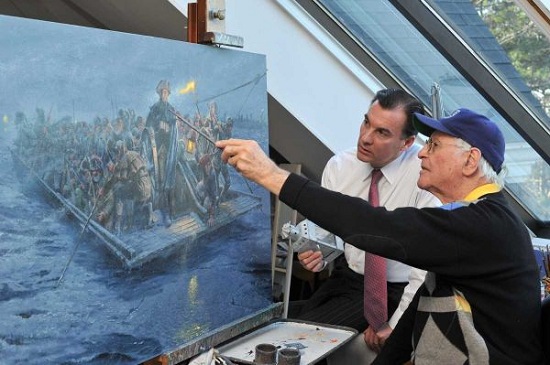
Tom Suozzi talks with artist Mort Kunstler in his studio about his version
of Washington Crossing the Delaware. (Photo: Newsday/Audrey C. Tiernan)
UPDATE: Here is a television segment featuring Mort’s painting on ABC World News.
After months of research, sketching and painting at the easel, our friend Mort Künstler has completed his version of George Washington's crossing of the Delaware River, a project intended to retain the drama of the iconic patriotic image painted in 1851 by Emanuel Leutze while correcting its myriad of mistakes. As one of his most challenging depictions, Mort himself has said that this will be the piece that he is remembered for.
Historians note Leutze's famous 1851 painting "Washington Crossing the Delaware," owned by the Metropolitan Museum of Art, contains numerous historical errors:
1. The original painting depicts the trip in daylight rather than at night, and in clear weather; the Dec. 1776, crossing took place in a nor'easter with heavy snow and sleet.
2. The Delaware River is not nearly as wide as depicted. At the crossing point, it's only 800 feet from Pennsylvania to New Jersey.
3. Leutze painted the river as being clogged with mini-icebergs rather than covered in broken-up sheet ice.
4. Standing in a small boat as the one depicted in a storm, Washington would have fallen overboard or capsized the craft. Longer Durham cargo vessels (one is shown in the background of the Künstler painting) carried soldiers while a flat-top ferry transported horses, cannons and probably Washington, historians say.
5. The most notable error is the inclusion of the American flag as the “Stars and Stripes” design was not adopted until 1777.
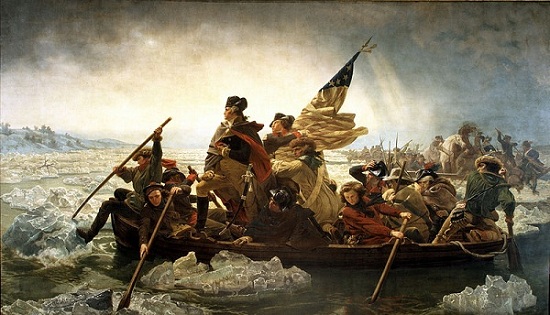
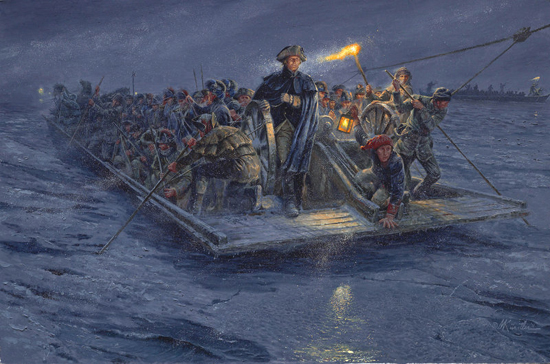
Posted by ny5/pinstripepress
at 8:30 AM EST
Updated: Wednesday, 28 December 2011 8:22 AM EST
Permalink |
Share This Post











